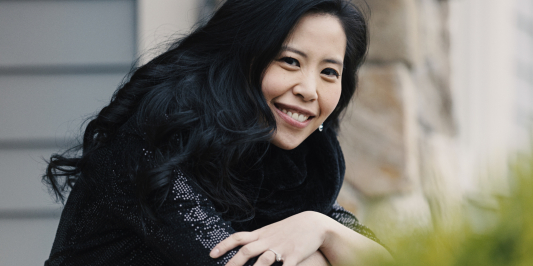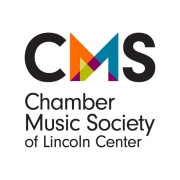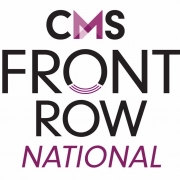Streaming on demand
Thurs., February 25th – Thurs., March 4th
Reservations for this past event are closed. Thank you to all who joined us!
Taiwanese-born pianist Gloria Chien and equally-regarded cohort of talented instrumentalists are part of this streaming virtual concert on demand, in partnership with Lincoln Center’s Chamber Music Society Front Row: National program.
A diverse musical life as a noted performer, concert presenter, and educator, Gloria was selected by the Boston Globe as one of its Superior Pianists of the year. She made her orchestral debut at the age of 16 with the Boston Symphony Orchestra with Thomas Dausgaard. In recent seasons she has performed as a recitalist and chamber musician at Alice Tully Hall, the Library of Congress, the Phillips Collection, the Kissinger Sommer festival, the Dresden Chamber Music Festival, and the National Concert Hall in Taiwan. She performs frequently with the Chamber Music Society of Lincoln Center and is an alum of CMS’s Bowers Program.
“I don’t remember a time when classical music was not played in my household growing up… I remember attending concerts when I was too small to even see the musicians, and I loved going to work with my mother sitting in the orchestra pit during opera productions. It has been quite a journey. And I am happy to say classical music was a way of life back then and I am grateful it still is today!”
Program
JOHN Field (1782-1837)
Nocturne No. 2 in C minor for Piano (1812)
Featuring: Gloria Chien, piano
FRANZ Liszt (1811-1886)
Grand duo concertant sur la romance de ‘Le Marin’ for Violin and Piano (1835)
Featuring: Benjamin Beilman, violin • Gloria Chien, piano
Felix Mendelssohn (1809-1847)
Quartet in C minor for Piano, Violin, Viola, and Cello, Op. 1 (1822)
Allegro vivace
Adagio
Scherzo: Presto
Allegro moderato
Featuring: Gloria Chien, piano • Sean Lee, violin • Richard O’Neill, viola • Narek Hakhnazaryan, cello
More Information
From Gloria Chien: All three works on this program are rarely-performed treasures by composers who greatly admired each other. They were written within a 23-year period. I hope these three pieces will take center stage in more concerts as each is a masterpiece in its own right!
Nocturne No. 2 in C minor for Piano (1812)
John Field (Dublin, 1782 – Moscow, 1837)
John Field is not frequently performed today but he had an outsize influence on early Romantic piano composition and performance. He was born in Dublin, educated in London, and spent most of his career in St. Petersburg, where successful foreign artists were well supported by the nobility. His influence reached across Europe through his many published works and he was acquainted with most of the famous composers of his day. Glinka described Field’s playing, “It seemed that he did not strike the keys but his fingers fell on them as large raindrops and scattered like pearls on velvet.” He is best known for inspiring Chopin to write nocturnes. Though Field didn’t invent the nocturne, he produced 16 of them (plus other short pieces in a similar style) that placed him at the forefront of a shift toward a sensitive new style of piano playing. His first three nocturnes were published in St. Petersburg in 1812 and the second, in C minor, is typical of the form. It’s a simple song with a twist—the interest is not in the melody but rather in the roiling accompaniment and fluid ornamentation, demonstrating the delicately melancholy, understated virtuosity that Field was known for.
From Gloria Chien: Field’s Nocturne No. 2 in C minor is an intimate, melancholic, hauntingly beautiful gem. For me, it is like a distant memory too precious to share. It certainly has all the essential elements that make nocturnes such a beloved genre embraced by all the composers.
Grand duo concertant sur la romance de ‘Le Marin’ for Violin and Piano (1835)
Franz Liszt (Raiding, Hungary, Austrian Empire, 1811 – Bayreuth, Germany, 1886)
Liszt was one of the leading virtuoso pianists of the 19th century. He ushered in the modern age of superstar piano soloists by championing sturdy, loud pianos (as opposed to lighter pianos more appropriate for the music of Field or Chopin) that could fill a hall meant for an entire orchestra. His influence touched nearly every aspect of the craft of piano playing:
“[Liszt] is still the model followed by pianists today,” writes Alan Walker in Grove Music Online. “He was the first to play entire programs from memory; the first to play the full range of the keyboard repertory (as it then existed) from Bach to Chopin; the first consistently to place the piano at right-angles to the stage, so that its open lid reflected the sound across the auditorium; the first to tour Europe from the Pyrenees to the Urals. Even the term ‘recital’ was his.”
Liszt also performed his own works, as well as over a hundred transcriptions, paraphrases, and fantasies on the works of other composers. He sometimes collaborated with other composers, as was the case with Charles Philippe Lafont and Lafont’s ballad Le départ du jeune marin (The Departure of the Young Sailor). This Grand duo is a set of intensely virtuosic variations on Lafont’s song complete with an introduction and coda. Lafont probably helped compose the violin part and the pair premiered the piece on October 1, 1835 in Geneva. Liszt revised the piece in 1849 and published it three years later. As the title implies, the piano doesn’t accompany the violin but is rather a full-fledged partner in this glittering duet.
From Gloria Chien: Liszt’s Grand duo is one of the most virtuosic pieces ever written for piano and violin. It is extremely difficult to coordinate and so satisfying when it works. I could not have asked for a better partner than Ben (Beilman). Ben and I have played some devilishly difficult pieces together over the years through CMS including Szymanowski’s Nocturne and Tarantella and this Grand duo. Both of these pieces require total trust in your partner, and Ben was right there with me every step of the way. It was a thrilling experience performing this piece with him on that stage! (And you might have noticed, there was so much momentum at the end that my iPad fell down! Thankfully it was at the home stretch so it was not disastrous, phew!)
Quartet in C minor for Piano, Violin, Viola, and Cello, Op. 1 (1822)
Felix Mendelssohn (Hamburg, 1809 – Leipzig, 1847)
Mendelssohn was a child prodigy. He may have been one of the most impressive musical prodigies who ever lived, maybe even better than Mozart. His young success is all the more remarkable because, unlike many child prodigies, he didn’t come from a musical family. His grandfather was the Enlightenment philosopher Moses Mendelssohn and his father, Abraham, was a successful banker first in Hamburg then Berlin. Also unlike many prodigies, Felix received a first rate general education with a strong grounding in the classics, including reading Shakespeare in German translation. His music education was likewise classically oriented. With his teacher Carl Friedrich Zelter, he studied the music of past great composers like Bach, Mozart, Haydn, and Handel. Zelter also led the Singakademie, which performed sacred vocal works by composers from the 18th century and earlier. Mendelssohn sang in the ensemble beginning at age 11 and was introduced to many older works that were otherwise not publicly performed.
By age 13, Mendelssohn had already written a wide variety of works but he decided to make his public composition debut with this piano quartet. He may have intended it as a tribute to Mozart, who had famously written two of them, or as a way of staying out of Beethoven’s shadow as he didn’t write any mature piano quartets. But in any case, the quartet is incredibly advanced for a composer who was barely a teenager when it was written. In the stormy key of C minor, the first movement begins almost hesitantly in the strings before launching into a full Classical-style sonata form. The second movement, a beautiful chordal ballad, has a fascinating episode where each string instrument enters in turn until the violin comes in on a gorgeously dissonant C-flat. The C minor scherzo features sparkling piano runs around a trio for viola, cello, and piano left hand. The last movement revisits the first movement with the same form and similar first theme, but in a faster, more impetuous tempo to end this remarkable debut by one of the most precocious composers of the 19th century.
From Gloria Chien: Mendelssohn’s Piano Quartet in C minor was his first published work at age 13, three years before he wrote his masterful String Octet. The piano takes the lead here and already shows all the great strengths of Mendelssohn’s lyricism as in his Songs Without Words as well as his signature scherzo writing that requires the utmost virtuosity and finesse. It is quite a workout for the pianist! Some of it feels like a Mendelssohn piano concerto.
About the Musicians
Violinist Benjamin Beilman has won praise both for his passionate performances and deep, rich tone which the Washington Post called “mightily impressive,” and the New York Times described as “muscular with a glint of violence.” Highlights of his 2018-19 season included play-directing and curating a program with the Vancouver Symphony; making his debut at the Philharmonie in Cologne with Ensemble Resonanz and with the Munich Chamber Orchestra in Koblenz; performing Four Seasons with the Cincinnati Symphony and Richard Egarr; returning to the City of Birmingham Symphony; and debuting with the Royal Scottish National Orchestra and Elim Chan. In recital, he was presented by Lincoln Center in New York, Spivey Hall in Atlanta, and the Kennedy Center in Washington, DC, and performed Mozart sonatas at Philadelphia’s Perelman Theater and Carnegie Hall with pianist Jeremy Denk. His European recital and chamber music engagements included the Moritzburg Festival, Concertgebouw, and Wigmore Hall for a BBC Radio 3 live broadcast. He released his first disc for Warner Classics in 2016, titled Spectrum and featuring works by Stravinsky, Janácek, and Schubert. An alum of CMS’s Bowers Program, Mr. Beilman studied with Ida Kavafian and Pamela Frank at the Curtis Institute of Music, and Christian Tetzlaff at the Kronberg Academy. He plays the “Engleman” Stradivarius from 1709 generously on loan from the Nippon Music Foundation.
Taiwanese-born pianist Gloria Chien has a diverse musical life as a noted performer, concert presenter, and educator. She was selected by the Boston Globe as one of its Superior Pianists of the year. She made her orchestral debut at the age of 16 with the Boston Symphony Orchestra with Thomas Dausgaard, and performed again with the BSO with Keith Lockhart. In recent seasons she has performed as a recitalist and chamber musician at Alice Tully Hall, the Library of Congress, the Phillips Collection, the Kissinger Sommer festival, the Dresden Chamber Music Festival, and the National Concert Hall in Taiwan. She performs frequently with the Chamber Music Society of Lincoln Center and is an alum of CMS’s Bowers Program. In 2009 she launched String Theory, a chamber music series at the Hunter Museum of American Art in downtown Chattanooga that has become one of Tennessee’s premier classical music presenters. The following year she was appointed Director of the Chamber Music Institute at the Music@Menlo festival by Artistic Directors David Finckel and Wu Han. In 2017, she joined her husband, violinist Soovin Kim, as Co-Artistic Director of the Lake Champlain Chamber Music Festival in Burlington, Vermont. The duo has recently been appointed Artistic Directors Designees at Chamber Music Northwest in Portland, OR. Ms. Chien received her bachelor’s, master’s, and doctoral degrees from the New England Conservatory of Music as a student of Russell Sherman and Wha-Kyung Byun. She is an artist-in-residence at Lee University in Cleveland, Tennessee and is a Steinway Artist.
Since winning the Cello First Prize and Gold Medal at the XIV International Tchaikovsky Competition, Narek Hakhnazaryan has performed with most major orchestras and in recital and chamber music across the globe at many of the world’s most prestigious festivals. He has played with orchestras such as the Orchestre de Paris, London Symphony, London Philharmonic, Rotterdam Philharmonic, Frankfurt Radio, Berlin Konzerthaus, Royal Stockholm Philharmonic, Chicago Symphony, LA Philharmonic, Baltimore Symphony, Sydney Symphony, Seoul Philharmonic, and NHK Symphony orchestras. A former BBC New Generation Artist, he has performed with all the BBC orchestras and debuted at the BBC Proms. In 2017 the Vienna Konzerthaus invited him to be a “Great Talent” and during the two seasons that followed he performed there regularly in recital, chamber music, and with orchestra. An eager chamber musician, he has performed at most major festivals worldwide and in major halls across Europe with chamber partners including Sergey and Lucine Khachatryan, Benjamin Beilman, Louis Schwizgebel, and Sergey Dogadin as well as the ZEN Trio. Mentored by Rostropovich, he received an Artist Diploma from the New England Conservatory where he studied with Lawrence Lesser. As First Prize winner in the 2008 Young Concert Artists International Auditions, he made his debut in Washington, DC and at Carnegie Hall. Mr. Hakhnazaryan was born in Yerevan, Armenia, and plays the 1707 Joseph Guarneri cello and F.X. Tourte and Benoit Rolland bows.
Violinist Sean Lee has captured the attention of audiences around the world with his lively performances of the classics. A recipient of a 2016 Avery Fisher Career Grant, he is one of few violinists who dares to perform Niccolò Paganini’s 24 Caprices in concert, and his YouTube series, Paganini POV, continues to draw praise for its use of technology in sharing unique perspectives and insight into violin playing. He has performed as a soloist with orchestras including the San Francisco Symphony, Israel Camerata Jerusalem, and Orchestra del Teatro Carlo Felice; and his recital appearances have taken him to Vienna’s Konzerthaus, Tel Aviv Museum of Art, and Carnegie Hall’s Weill Recital Hall. As a season artist at the Chamber Music Society of Lincoln Center and an alum of CMS’s Bowers Program, he continues to perform regularly at Lincoln Center, as well as on tour. Originally from Los Angeles, Mr. Lee studied with Robert Lipsett of the Colburn Conservatory and legendary violinist Ruggiero Ricci before moving at the age of 17 to study at The Juilliard School with his longtime mentor, violinist Itzhak Perlman. He currently teaches at The Juilliard School’s Pre-College Division, as well as the Perlman Music Program. He performs on a violin originally made for violinist Ruggiero Ricci in 1999 by David Bague.
Violist Richard O’Neill is an Emmy Award winner, two-time Grammy nominee, and Avery Fisher Career Grant recipient. He has appeared with the London, Los Angeles, Seoul, and Euro-Asian philharmonics; the BBC, KBS, Hiroshima and Korean symphonies; the Moscow, Vienna, Württemburg and Zurich chamber orchestras; and Kremerata Baltica and Alte Musik Köln with conductors Andrew Davis, Vladimir Jurowski, François-Xavier Roth, and Yannick Nézet-Séguin. Highlights of last season include the complete Beethoven string quartet cycle for the Seattle Chamber Music Society with the Ehnes Quartet, and a South Korean recital tour with harp player Emmanuel Ceysson. As a recitalist he has performed at Carnegie Hall, David Geffen Hall, Disney Hall, Kennedy Center, Wigmore Hall, Louvre, Salle Cortot, Madrid’s National Concert Hall, Teatro Colón, Hong Kong’s Cultural Center, Tokyo’s International Forum and Opera City, Osaka Symphony Hall, and LOTTE Concert Hall and Seoul Arts Center. A Universal/DG recording artist, he has made nine solo albums that have sold more than 200,000 copies. His chamber music initiative DITTO has introduced tens of thousands to chamber music in South Korea and Japan. An alum of CMS’s Bowers Program, he was the first violist to receive the artist diploma from Juilliard and was honored with a Proclamation from the New York City Council for his achievement and contribution to the arts. He serves as Goodwill Ambassador for the Korean Red Cross, the Special Olympics, and UNICEF and runs marathons for charity. He recently joined the Takács Quartet as their new violist.
Streaming Tips & Tricks
Helpful tips to enjoy the show:
- You can stream the concert from any device with a strong internet connection. Sound quality will vary depending on the speakers and device you are using. Some of the ways to get optimal sound quality include:
- Connect to Bluetooth speakers from your mobile phone or tablet
- Connect high quality speakers to a desktop or laptop computer
- Listen with headphones(Hint: if you are viewing on a device which can receive messages/calls, we recommend you switch on “do not disturb” so you can enjoy the program without interruptions.)
- If your program doesn’t begin playing automatically, click the “play” icon located in the lower left corner of the video.(Another good troubleshooting idea is to hit the “refresh” button on your web browser.)
- Click the full screen icon to the left of the CMS logo to get the best viewing experience:
- Can’t hear anything? Don’t forget to unmute/turn up the volume on your device!
- To stream the video to your home TV:If you are an Apple user, you can use AirPlay or screen mirroring to display the video from your iPhone, iPad, or iMac to your Apple TV (or other smart TV with AirPlay capability).
You can also achieve this using an HDMI cable to send the signal from your laptop to your TV.
- Need a break? You can pause the performance, but if you close out of the browser window, you will lose your place in the video, so make sure to note the time you are stopping if you are not returning right away and want to resume from where you left off.





